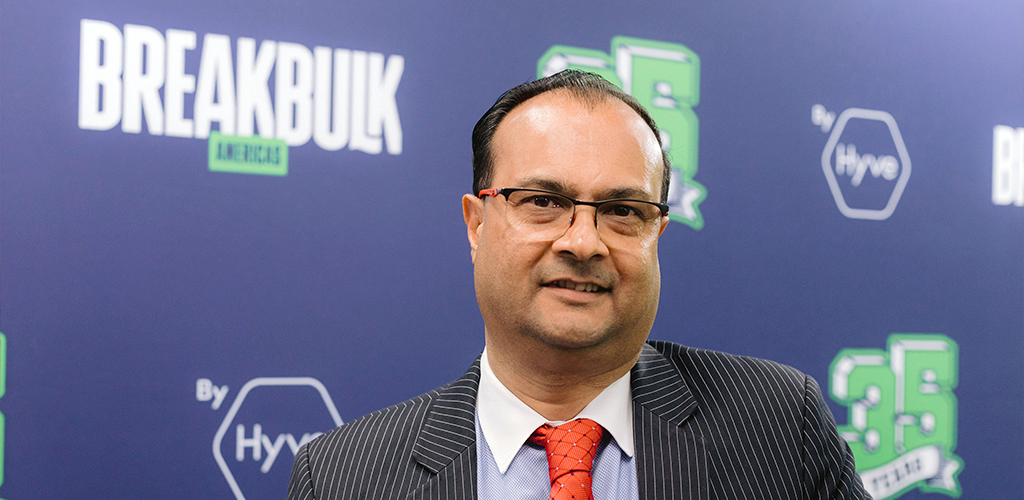Rhenus Executive on His 30-Year Career and the Importance of Staying the Course
By Luke King

There is something about the logistics industry that draws you in – and keeps you there,” says Colin D’Abreo, co-vice president director of Rhenus Project Logistics Global.
A part-time job in an import/ export company was D’Abreo’s first introduction to the logistics industry. He was studying business management in Los Angeles at the time – though shipping was already part of his DNA.
His father, an engineer by trade, had served in the Royal Indian Navy, including during the Second World War. “Among my siblings I have three brothers, and all are connected with the shipping industry – the first a captain, the second a radio officer (they are both now retired) and the third an engineer. Then there’s me involved in project freight forwarding,” says D’Abreo.
Born and raised in Mumbai, he graduated in mathematics, statistics and economics before leaving India at the age of 21 to study business management and receive his MBA from the University of California in Los Angeles. In 1995, he moved to New York to take up a post as an import/export coordinator with KOG Transport – which was acquired 20 years later by Rhenus Logistics.
D’Abreo rose through the ranks, as supervisor, manager, assistant vice president, executive vice president and then president of KOG – later becoming president of Rhenus Projects Logistics in the U.S.
In May this year, Rhenus Group appointed Colin D’Abreo and Moritz Becker as co-vice president directors of its Project Logistics Global brand. D’Abreo is charged with overseeing operations in the Americas, India, China and the Middle East and Africa (MEA).
“I will have been in the industry for 30 years in April 2025. I have enjoyed the ride and continue to do so,” he said. “For me, staying and growing with the same company has been a positive. I started at the lowest level but had opportunities and also very good mentors and advisers who guided me through. That resonates in my life now – I try to empower the younger generation to get to the next level.”
He recalls that once he became involved in logistics at the start of his career, he truly enjoyed it. “There is something in the industry that just draws you to it,” he says.
Different Perspectives
That early excitement has never left him. “Every day on the job is different and exciting. No two projects are identical, and all have their different challenges and opportunities. Working alongside an incredible team of professionals globally certainly adds some spice to the workday.
“The way I like to manage challenges and discussions is never a top-down approach, but rather a collaborative and open discussion. Being in the industry for 30 years certainly has given me a good grounding to conduct my job – but for me, it is exciting to engage with our colleagues who are just starting in the industry and also constantly learn from them.”
Young people bring in new ideas and new ways of thinking, he adds. “I think the younger generation are always thinking out of the box. For our generation, it’s easy to fall back on ‘yes I know, I’ve done it, let’s do it this way,’ but when the youngergeneration engage in debate that really gives you a different perspective.”
He also takes pride in the fact that the Rhenus office in New York has staff from across the globe, including Ukraine, Brazil, Peru, Italy and Germany. “I think each person brings the strengths of their own culture. You learn a lot from people and their cultures.”
From technology and digitalization to sustainability and decarbonization, the industry has advanced significantly since D’Abreo started his career.
He says: “In my 30 years of logistics, I have seen changes in leaps and bounds, and all in a good way. I entered the industry in the dying stages of the telex machine. Then it was the fax, before the computer industry and emails took over. Now, with sophisticated tracking systems, information about cargo and other information is available in real time.”
He recalls laboriously typing out Bills of Lading: “Now it’s a matter of seconds copying over a BoL on the computer.”
Improved technology which constantly changes makes a big impact in the industry, he says. “For example, our Rhenus Engineering team (under Rhenus Projects) when conducting load/offload surveys at terminals can provide instant reports in real-time via the mobile phone of a client who may be sitting hundreds or thousands of miles away.”
Focus on Sustainability
It is also important that more and more companies in the logistics sector have an eye on sustainability and green energy, he says. “We are strong advocates of green energy, and we see the potential for significant growth in this sector with the right infrastructure investment.”
Rhenus is committed to sustainability through its RheGreen program, which identifies and suggests which aircraft is the most efficient in terms of CO2 emissions for cargo movements. “We play a role in measuring CO2 emissions for our customers, especially in container shipping and trucking. We are also exploring alternative fuels and electric trucks as sustainability plays an integral part in the process.”
Going green is never one-sided, he says. “It is a combination, a partnership. Price is very important for customers these days but there are more and more projects and tenders coming out from companies which give extra points for sustainability and sustainability programs.
“I believe that in time to come even though price will continue to be one of the dominating factors, increasing importance will be placed on green programs. Companies will leverage their advantages in spending a little more money but having a green program.”
This has been an interesting and exciting year for Rhenus, says D’Abreo. “In Global Projects, with the new heads – Moritz and myself – we have a new vision and exciting journey ahead. Rhenus Logistics, with the acquisition of BLU Logistics in Latin America towards the end of last year, has seen a lot of growth as a company, and our leadership will look to strengthen us across the globe.”
Pivoting on a Dime
However, the unpredictable geopolitical situation poses tremendous challenges. “Having to pivot on a dime seems to be more the norm than the exception,” he says. “Take the Red Sea situation, Panama Canal issues, Ukraine/Russia war, among others, which certainly throw a wrench in your traditional logistics plans. One has to always keep thinking of different and innovative ways to minimize the overall impact.”
The scarcity of experienced professionals in project logistics adds pressure to daily operations, he adds. While the industry has not done well in attracting younger talent in recent years, he believes that is changing as universities are now pushing the logistics field and many companies are promoting traineeships. “At Rhenus we have a very robust training program across the world. We need to encourage young people into logistics.”
He is pleased that the industry has recognized the challenge - and is doing something about it. “It may be late, but it is never too late.”
His advice to young people coming into the industry today? “My advice is to stay the course. Take in everything, learn as much as you can, but also be the change that should be – meaning be proactive, curious, inquisitive, and don’t be afraid to ask questions.
“Logistics may seem simple from the outside, but it’s a very complex industry where innovation is key. While it may be stressful at times, it is also fun and rewarding. Global logistics allows you to meet and interact with different people and cultures across the globe.”
Looking ahead, D’Abreo says projects will get even more challenging. “There will be more mega projects being built around the world, and we will have to find different ways to be able to meet these challenges. I believe the race for energy and alternative fuels is going to be a gamechanger in our industry.”

D’Abreo lives in downtown Manhattan with his wife and two daughters aged 13 and 16. Balancing two demanding careers with the needs of two teenage daughters poses interesting challenges when it comes to maintaining a balance.
“Work/home balance is always important but it’s also OK for one to take precedence over the other from time to time, as long as the other is not ignored. With my frequent travels and my wife’s long work hours, we don’t believe that our kids have lost out on anything, as we make sure that at least one of us is always there for our children.” Family vacations are important, including a yearly skiing trip to Canada, and in summer the family enjoys cycling around the city. Cooking is an activity that de-stresses him – he likes listening to music while working in the kitchen.
He gets to the gym three times a week and walks about ten miles every weekend. “I am a big enthusiast for health and exercises – to help the mind and body.”
*Breakbulk Exhibitor
